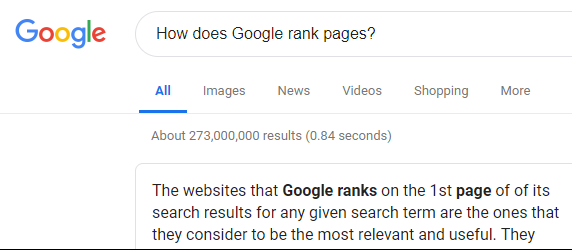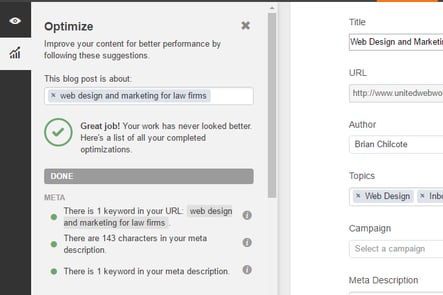
Google a phrase like this one:
"How does Google rank pages?"
...and in less than one second, it gives you a list of ten links you can click on to learn more. That's ten possibilities out of 273 million. How does Google decide what makes the front page what doesn't?
If you're a business of any size hoping to attract searchers to your products or services, the answer to that question should matter to you. Think about the last time you clicked past the second or third page of results to find what you were looking for. Your customers won’t click that far either!
Part of the work that a Search Engine Optimization (SEO) provider like us can do for our clients is stay on top of how Google ranks pages and places them on the search returns page (SERP). Probably the most important set of factors Google uses to determine the rankings of links on the SERP falls under the principle of relevance to the searcher, but there are also a number of other factors to keep in mind when you want to convince a search engine that you are indeed relevant and belong on that first page!
While Google doesn't tell us all the details of their algorithms, they do assure us that if you want a good ranking, relevance is super important. The day a search engine like Google, Yahoo or Bing fails to give searchers a list of truly relevant results is the day they lose our confidence.
So, how do you convince Google and other search engines that your content is relevant to your target audience? Here's what The Google Search Quality Team has to say,
"You should optimize your site to serve your users' needs. One of those users is a search engine, which helps other users discover your content. Search Engine Optimization is about helping search engines understand and present content."
How does a business website help a search engine out? What makes it easy for Google to find your site and count it as relevant to someone who is searching for you? While not spilling the beans on too many details, Google does have some preferred best practices they recommend.
Make sure Google knows you're there!
Although the search giant's robots are continuously patrolling the internet for new websites, it's remotely possible that yours hasn’t been indexed yet. Why? It could be because it's not connected to any other websites that might lead to yours, or there may be a policy or setting in the background that has made you invisible. If it's a brand new site with a new domain (the part of the address that contains the .com, .org or .net), it's possible Google hasn't found you yet.
Registering on Google's Search Console and submitting a sitemap can do the trick, but usually once your site is built and published, search engines will see it on their own.
Help Google understand your content
Each page on your website should have a unique title and properly labeled "metadata" that tells a Google robot what the page is about. Most content management systems (CMS) build this in, so when you publish content, the platform gives you easy access to editing your page's metadata.
What is Metadata?
Hidden attached information is everywhere. Bar codes can carry additional information that is invisible to the casual observer- in fact, it takes a laser scanner to "see" it and a computer to decode what's there. Metadata is simply information about what you see on a screen that is invisible to a viewer but very important to the computers that display it.
Tags are bits of metadata that can tell a roaming robot if a certain line of text is a title, a subheading or just plain body text. Attached to a picture, it can indicate what the photo depicts. If you want to indicate that a line of text is in fact a title, your CMS allows you to format it in what-you-see-is-what-you-get, but behind the scenes, it attaches this tag to it: <title>
When we build a site here at United WebWorks, we make sure every page has a title that is tagged to describe the page's content or purpose. They should be concise and relevant to what is actually on the page (indexing robots check for this!), not too long and easily readable.
Structuring a page with the right headings and subheadings also helps Google understand a page. It makes sense- it's the same for humans readers. A page with clear subheadings makes it easy to quickly see if a page is relevant to what they are looking for.
Organize your site hierarchy
Simple and quick navigation is also a relevance factor. A site that is a jumbled mess shouldn't rank higher than one that has more user-friendly ways to get information. Even though Google may return one page of your website in response to a search, it likes to know how that page fits into the overall scheme of your website.
A well-planned hierarchy of pages will score points with search engines. Here's what the experts say:
"Make it as easy as possible for users to go from general content to the more specific content they want on your site. Add navigation pages when it makes sense and effectively work these into your internal link structure. "
Plan out how your visitors will move from your home page to the various additional branches of information. In WordPress, you can indicate whether or not a page is considered cornerstone information- a page that can support any number of subpages that go into more detail if the visitor wants to explore.
For example, a cornerstone page might survey a broad topic like Neurology with subheadings like "The History of Neurology, and "Parts of the brain," and is then linked to blogs on "What is an axon?" or "Improving your memory," and "Neurological diseases."
Make yours the most interesting site on the internet
Search engine indexing robots are getting smarter by the day. Along with a corps of human rankers who review the process, Google's algorithms can look at written content and decide how readable it is to human readers- right down to grammar, spelling and word choice.
"Creating compelling and useful content will likely influence your website more than any of the other factors…" say Google staffers. They recommend finding out what your readers want and giving it to them in high quality written content that includes key words and phrases. Include some of the various permutations that searchers are likely to ask their phones or type into a search window.
https://support.google.com/webmasters/answer/7451184?hl=en
Google recommends adding new unique content regularly while avoiding these common mistakes:
-
Poorly produced pieces with a lot of mistakes
-
Forgetting to use shorter paragraphs with subheadings that organize the information for the reader
-
Rewriting multiple content pieces on the same topics
-
Inserting awkward sounding keywords or phrases that might annoy the reader
-
Trying to deceive search robots by including invisible keywords (as in writing in a white font color on a white background). Remember- the page's metadata tags reveal all!
-
Arranging pages or content in a disorganized way that is hard to find
Links and Anchor Text
You've clicked on text-based links before- they are usually a different color and / or underlined to indicate clickability. The words in the clickable phrase are referred to a anchor text, and many content writers make the mistake of using the phrase click here as anchor text. Far better to spell out what's to expect on the other end of the click! Instead of click here, use Find out more about gray matter in this article as anchor text.
Optimize images
Indexing robots aren't quite ready to perceive images the same way humans do, so if you have a photo or some other kind of graphic, spell out what it contains using an alt-tag. If you feature a photo of a brain on a page whose keyword is "neuroscience," attach an alt-tag that says, "human brain neuroscience" so the robot sees both the keyword and the topic of the photo.
Make it mobile friendly
A few years ago, Google updated their ranking algorithms with an upgrade that came to be known as "Mobilegeddon." Because a growing percentage of searchers were using handheld devices for search, Google figured it was time to encourage all websites to add a responsive feature that recognized the kind of device used to access the site and adjust accordingly. There are still a few sites that are not mobile-responsive; they appear as tiny, unreadable versions of their larger-screen selves on your phone.
Why "Mobilegeddon?" because many sites ignored the update or failed to meet the deadline and predictably disappeared from the first page of search returns. It's imperative that your site is mobile-friendly, and you can't fault Google for pushing the idea. If people are searching on their phones, it's a relevance factor!
Promote your site
There are lots of ways to get the word out about your awesome business website. Adding your URL to business cards and print ads can help. So can social media posts, emails and participation in online forums or discussion groups.
Google My Business (GMB) is another great way to get the word out. If you don't have a GMB account, stop now and go do it! It's free and will include you in the list of businesses that pop up in the local search results, complete with a map showing your location.
Until you are ready to buy advertising through Google, it's the best way to appear toward the top of any search returns page, especially if you're active in keeping your GMB account up to date with new photos and responses to reviews.
Analyze and adjust
Take measurements of your site's performance down to details like the demographics of visitors, times of day your site is most busy, what pages they visit most and what their paths are (what pages they visit, how long they stay on each page and where they go next.) You can get some great insights and ideas for how to improve by allowing the data to tell the story.
Google's Search Console can be a big help in finding the weak spots in your site by allowing you to
- Test and submit your sitemap
- Find issues with title and metadata tags
- Understand more about what search phrases are used to find you
It definitely throws a learning curve at you, but there's help in figuring it out.
There's a lot we didn't include in this basic orientation to SEO! Believe or not, there's more to effective SEO than we were able to include in this article. If you'd like your website to play a starring role in Google's search returns, talk
 to us! We can help your business website stand out by making sure everything about it is search engine friendly. Internet Marketing is our forte!
to us! We can help your business website stand out by making sure everything about it is search engine friendly. Internet Marketing is our forte!
Refer to Google's Search Engine Optimization (SEO) Starter Guide for more (a LOT more) information. The quotes in this article came from the page linked here.
